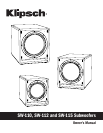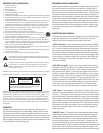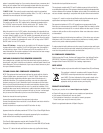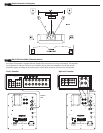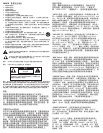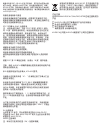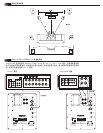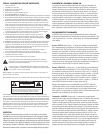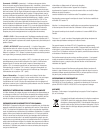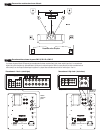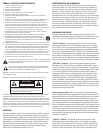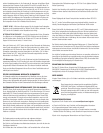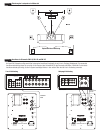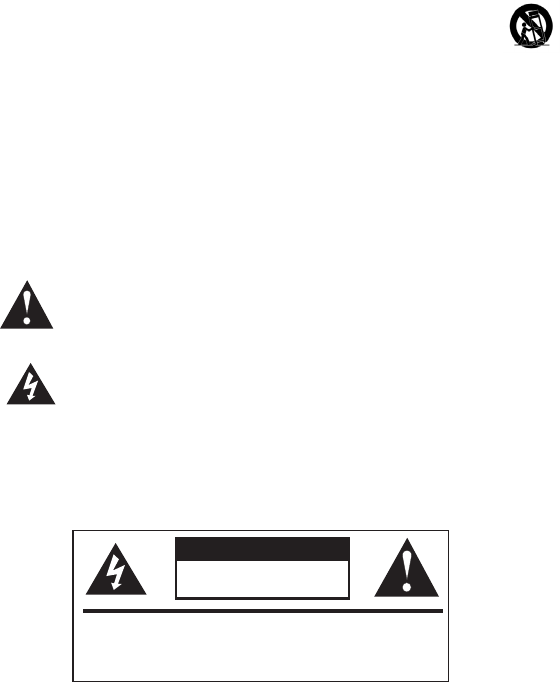
IMPORTANT SAFETY INSTRUCTIONS!
1. READ these instructions.
2. KEEP these instructions.
3. HEED all warnings.
4. FOLLOW all instructions.
5. DO NOT use this apparatus near water.
6. CLEAN ONLY with dry cloth.
7. DO NOT block any ventilation openings. Install in accordance with the manufacturer’s instructions.
8. Do not install near any heat sources such as radiators, heat registers, stoves, or other appara-
tus (including amplifiers) that produce heat.
9. DO NOT defeat the safety purpose of the polarized or grounding type plug. A polarized plug has
two blades with one wider than the other. A grounding type plug has two blades and a third
grounding prong. The wider blade or the third prong are provided for your safety. If the provided
plug does not fit into your outlet, consult an electrician for replacement of the obsolete outlet.
10. PROTECT the power cord from being walked on or pinched, particularly at plugs, convenience
receptacles, and the point where they exit from the apparatus.
11. ONLY USE attachments/accessories specified by the manufacturer.
12. USE only with a cart, stand, tripod, bracket, or table specified by the manufacturer,
or sold with the apparatus. When a cart is used, use caution when moving the cart/
apparatus combination to avoid injury from tip-over.
13. UNPLUG this apparatus during lightning storms or when unused for long periods of time.
14. REFER all servicing to qualified service personnel. Servicing is required when the apparatus
has been damaged in any way, such as power-supply cord or plug is damaged, liquid has been
spilled or objects have fallen into the apparatus, the apparatus has been exposed to rain or
moisture, does not operate normally, or has been dropped.
15. DO NOT expose this apparatus to dripping or splashing and ensure that no objects filled with
liquids, such as vases, are placed on the apparatus.
16. To completely disconnect this apparatus from the AC Mains, disconnect the power supply cord
plug from the AC receptacle.
17. The mains plug of the power supply cord shall remain readily operable.
The exclamation point, within an equilateral triangle, is intended to alert the user to
the presence of important operating and maintenance (servicing) instructions in the
literature accompanying the product.
The lightning flash with arrowhead symbol within an equilateral triangle, is intended
to alert the user to the presence of uninsulated “dangerous voltage” within the
product’s enclosure that may be of sufficient magnitude to constitute a risk of
electrical shock to persons.
WARNING: To reduce the risk of fire or electrical shock, do not expose this apparatus to rain or moisture.
WARNING: No naked flame sources – such as candles – should be placed on the product.
WARNING: This product is intended to be operated ONLY from the AC Voltages listed on the back
panel or included power supply of the product. Operation from other voltages other than those
indicated may cause irreversible damage to the product and void the products warranty. The use
of AC Plug Adapters is cautioned because it can allow the product to be plugged into voltages
in which the product was not designed to operate. If the product is equipped with a detachable
power cord, use only the type provided with your product or by your local distributor and/or
retailer. If you are unsure of the correct operational voltage, please contact your local distributor
and/or retailer.
INSPECTION
We want your new speaker system to look as good as it did leaving the fac-
tory! Please check promptly for any transit damage. Carefully unpack your new
speaker system and verify the components against the packing list. In extreme
circumstances, items may have become damaged in transit. If any damage is dis-
covered, notify the delivery service and dealer where the system was purchased.
Make a request for inspection, and follow their instructions for evaluation. Be sure
to keep the product’s original shipping carton.
POSITIONING YOUR SW SUBWOOFER
Klipsch
®
powered subwoofers are designed to reproduce deep bass and deliver
the impact that makes your movies and music come alive. Typically, optimum
performance will result if you place your subwoofer in a corner of the room on
the same wall as your front channel speakers (Refer to Figure 1). Please note that
room placement can have a dramatic effect upon the performance of your pow-
ered subwoofer. Corner placement, as suggested above, will increase the amount
of bass output, while placing the subwoofer along the middle of a wall, or out in
the room will decrease the amount of bass output. Experiment with a number of
different placement options and control settings to find the one that best suits
your particular room and taste. When choosing your subwoofer’s location, keep
in mind that you will need to connect the subwoofer’s built-in amplifier to an AC
power outlet.
CONNECTIONS AND CONTROLS
CAUTION: Ensure that the subwoofer is unplugged from the AC wall outlet before
making any connections. Do not connect both “High Level” and “Line Level”
inputs at the same time as damage to your equipment could result!
“LINE IN” Connection - Most of today’s surround receivers (and pre-amplifiers)
have a line level subwoofer output labeled Subwoofer Pre Out, Sub Out, SW Out,
etc. If you have this output, connect one end of a subwoofer cable to it and con-
nect the other end of the cable into the subwoofer line input labeled LEFT/LFE.
This connection allows the subwoofer to operate with both music and surround
sound movies (refer to your receiver manual). In absence of a subwoofer output
on your receiver, as an alternative hookup, you can connect Left and Right chan-
nel Pre-Amp Outputs from your receiver (if provided) to the Left/LFE and Right
input on the subwoofer.
“HIGH LEVEL” Connection - If your receiver (or pre-amplifier) does not have a
Subwoofer Pre Out, Sub Out, SW Out, etc. connection, you can connect the SW
subwoofer via the High Level Connection. Using 16 gauge or larger speaker
wire, connect the RED “positive” (+) terminal of your amplifier’s LEFT channel to
the RED (+) terminal of your subwoofer’s LEFT channel (High Level In). Connect
the BLACK “negative” (-) terminal of your amplifier’s LEFT channel to the BLACK
“negative” (-) terminal of your subwoofer’s LEFT channel input (High Level In).
Repeat this procedure for connecting your amplifier’s RIGHT channel input. Take
care that no bare wires from any of the connections touch any other terminals,
or each other, as this could damage your equipment. This connection to your
receiver will be to the same terminals as your main speakers are connected to.
“GAIN” Control - If your subwoofer is connected to a Subwoofer Output of a sur-
round receiver, first set the subwoofer volume level control in the receiver to the
“half way” or “0 dB” position. Then increase the volume (or gain) of the subwoofer
up until the subwoofer’s volume level matches the output of your main speakers.
After this setup is completed, the volume control on your system’s main amplifier
or pre-amplifier will be the volume control for both your subwoofer and speakers
together. If your subwoofer is connected to the L/R Pre-Amp Outputs of a receiver
or connected via the High-Level connection to the receiver’s speaker terminals,
there will be no subwoofer volume in that receiver to set before setting the sub-
woofer’s gain control.
“LOWPASS” Control - The crossover point chosen determines where low bass
frequencies are “handed off” from the speakers to the subwoofer. If setting the
crossover point in the receiver, turn the Lowpass Filter knob on the subwoofer
to the farthest point right (150Hz). Set the crossover point based on the size of
the main left/right speakers you are using in the system. As a general rule, for
larger, floorstanding speakers, set the crossover point between 50Hz-90Hz. If
using small bookshelf or “satellite” speakers for the mains, set the crossover point
between 90Hz-150Hz. The smaller the speaker, the higher the setting until the
bass frequencies blend well between the speakers and your subwoofer once your
CAUTION
RISK OF ELECTRIC SHOCK.
DO NOT OPEN.
WARNING: Do Not Open! Risk of Electrical Shock. Voltages in this
equipment are hazardous to life. No user-serviceable parts inside.
Refer all servicing to qualified service personnel.



